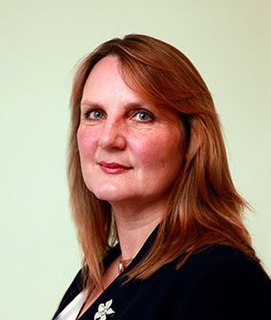Related Research Articles
The Medicines and Healthcare products Regulatory Agency (MHRA) is an executive agency of the Department of Health and Social Care in the United Kingdom which is responsible for ensuring that medicines and medical devices work and are acceptably safe.
The Health and Social Care Select Committee is a Departmental Select Committee of the British House of Commons, the lower house of the United Kingdom Parliament. Its remit is to examine the policy, administration and expenditure of the Department of Health and Social Care (DHSC) and its associated agencies and public bodies. The Clerks of the Committee are Previn Desai and Joanna Dodd.
Susan Fiona Dorinthea Michie is a British academic, clinical psychologist, and professor of health psychology, director of The Centre for Behaviour Change and head of The Health Psychology Research Group, all at University College London. She is also an advisor to the British Government via the SAGE advisory group on matters concerning behavioural compliance with government regulations during the COVID-19 pandemic.
The Johns Hopkins Center for Health Security is an independent, nonprofit organization of the Johns Hopkins Bloomberg School of Public Health. The Center works to protect people’s health from epidemics and pandemics and ensures that communities are resilient to major challenges. The Center is also concerned with biological weapons and the biosecurity implications of emerging biotechnology.
A hospital network is a public, non-profit or for-profit company or organization that provides two or more hospitals and other broad healthcare facilities and services. A hospital network may include hospitals in one or more regions within one or more states within one or more countries. A hospital network has one headquarter, usually within one of the regions served by the network facilities.

The National Health Service (NHS) is the umbrella term for the publicly funded healthcare systems of the United Kingdom (UK). Since 1948, they have been funded out of general taxation. There are three systems which are referred to using the "NHS" name. Health and Social Care in Northern Ireland was created separately and is often locally referred to as "the NHS". The four systems were established in 1948 as part of major social reforms following the Second World War. The founding principles were that services should be comprehensive, universal and free at the point of delivery—a health service based on clinical need, not ability to pay. Each service provides a comprehensive range of health services, free at the point of use for people ordinarily resident in the United Kingdom apart from dental treatment and optical care. In England, NHS patients have to pay prescription charges; some, such as those aged over 60 and certain state benefit recipients, are exempt.
The National Institute for Health and Care Research (NIHR) is a United Kingdom government agency which funds research into health and social care in England. With a budget of over £1.2 billion in 2019–20, its mission is to "improve the health and wealth of the nation through research". The NIHR was established in 2006 under the government's Best Research for Best Health strategy, and is funded by the Department of Health and Social Care. As a research funder and research partner of the NHS, public health and social care, the NIHR complements the work of the Medical Research Council. NIHR focuses on the all aspects of the research process, from translating laboratory findings to clinical research to applying the discoveries in health and social care.

The National Security Council (NSC) is a United Kingdom cabinet committee. The NSC's terms of reference was said in November 2020 to consider matters relating to national security, foreign policy, defence, international relations and development, resilience, energy and resource security; however, it has been since noted that Prime Minister Boris Johnson has agreed new terms of reference.

Public Health England (PHE) was an executive agency of the Department of Health and Social Care in England which began operating on 1 April 2013 to protect and improve health and wellbeing and reduce health inequalities. Its formation came as a result of the reorganisation of the National Health Service (NHS) in England outlined in the Health and Social Care Act 2012. It took on the role of the Health Protection Agency, the National Treatment Agency for Substance Misuse and a number of other health bodies. It was an executive agency of the Department of Health and Social Care, and a distinct delivery organisation with operational autonomy.

Michelle Lorraine Ballantyne is a British politician and former nurse who served as Leader of Reform UK Scotland from January 2021 to February 2022. She was a Member of the Scottish Parliament (MSP) for the South Scotland region from 2017 to 2021.

Dame Jennifer Margaret Harries is a British public health physician who has been the chief executive of the UK Health Security Agency and head of NHS Test and Trace since April 2021. She was previously a regional director at Public Health England, and then Deputy Chief Medical Officer for England from June 2019 to April 2021.

Public Health Scotland (PHS) is the national public health body for Scotland. It is a Special NHS Health Board, and it is jointly accountable to the Convention of Scottish Local Authorities (COSLA) and the Scottish Government. Fully exercising its functions from 1 April 2020 as Scotland's leading national agency for improving and protecting the health and well-being of all of Scotland's people, it is jointly sponsored by COSLA and the Scottish Government, and collaborates with third sector organisations.

NHS COVID-19 is a voluntary contact tracing app for monitoring the spread of the COVID-19 pandemic in England and Wales. It has been available since 24 September 2020 for Android and iOS smartphones, and can be used by anyone aged 16 or over.

NHS Test and Trace is a government-funded service in England, established in 2020 to track and help prevent the spread of COVID-19. Despite its name, the programme was never in fact run by the NHS: the programme is part of the UK Health Security Agency; the service and the agency are headed by Jenny Harries.

The Health Protection (England) Regulations 2020 is a statutory instrument (SI) enacted on 4 July 2020 by the Secretary of State for Health and Social Care, Matt Hancock, in response to the COVID-19 pandemic. It replaced and relaxed the previous Lockdown Regulations, and gave the Secretary of State powers to make declarations restricting access to public outdoor places.

The UK Health Security Agency (UKHSA) is a government agency in the United Kingdom, responsible since April 2021 for England-wide public health protection and infectious disease capability, and replacing Public Health England. It is an executive agency of the Department of Health and Social Care (DHSC).

The Vaccine Taskforce in the United Kingdom of Great Britain and Northern Ireland was set up in April 2020 by the Second Johnson ministry, in collaboration with Chief Scientific Advisor Patrick Vallance and Chief Medical Officer Professor Chris Whitty, in order to facilitate the path towards the introduction of a COVID-19 vaccine in the UK and its global distribution. The taskforce acts to coordinate the research efforts of government with industry, academics and funding agencies in order to be able to make timely decisions which expedite vaccine development and deployment.

The Minister of State for Care and Mental Health is a mid-level position in the Department of Health and Social Care in the British government. It is currently held by Gillian Keegan MP who took the office on 16 September 2021. The minister often deputises for the Secretary of State for Health and Social Care alongside the Minister of State for Health. The minister is in charge of social care in England.
This is a timeline of the COVID-19 pandemic in Saskatchewan.

The Parliamentary Under-Secretary of State for Vaccines and Public Health is a position in the Department of Health and Social Care in the Government of the United Kingdom. The minister is responsible for COVID-19 vaccination in the United Kingdom. The role has sometimes been known as the Parliamentary Under-Secretary of State for Public Health and Minister of State for Public Health.
References
- ↑ Dan Sabbagh and Ian Sample, Senior counter-terror official put in charge of new UK biosecurity centre, The Guardian , 12 May 2020. Accessed 24 May 2020.
- ↑ "Joint Biosecurity Centre" (Press release). London: www.gov.uk. Retrieved 29 October 2020.
- ↑ "Securing our health: the UK Health Security Agency". GOV.UK. Retrieved 24 March 2021.
- ↑ "Minister of State (Minister for Care)". GOV.UK. Retrieved 30 July 2021.
{{cite web}}: CS1 maint: url-status (link) - 1 2 Warrell, Helen; Neville, Sarah (5 June 2020). "Senior spy appointed to lead UK's joint biosecurity centre" . Financial Times. Retrieved 3 August 2021.
{{cite web}}: CS1 maint: url-status (link) - 1 2 "Senior civil servant and former lecturer in medical statistics appointed to Joint Biosecurity Centre" (Press release). London: www.gov.uk. Department of Health and Social Care. 5 June 2020. Retrieved 29 October 2020.
- ↑ Mason, Rowena; Allegretti, Aubrey (2 August 2021). "Johnson dumps 'amber watchlist' plan as it emerges top adviser has quit". the Guardian. Retrieved 3 August 2021.
{{cite web}}: CS1 maint: url-status (link) - 1 2 "Dr Thomas Waite". GOV.UK. Retrieved 30 July 2021.
- 1 2 Adams, Callum (17 October 2020). "Director of 'secretive' scientific body placing cities into lockdown accused of hypocrisy" . The Telegraph. Archived from the original on 12 January 2022. Retrieved 30 July 2021.
- 1 2 "Mary Gregory to Johanna Hutchinson: Statistics informing quarantine requirements for arrivals to England". Office for Statistics Regulation. 27 July 2021. Retrieved 30 July 2021.
{{cite web}}: CS1 maint: url-status (link) - 1 2 Gardner, Bill (11 October 2020). "Call to end secrecy of body driving UK's new Covid lockdowns" . Telegraph Media Group Limited. Archived from the original on 12 January 2022.
- ↑ Allegretti, Aubrey; Grover, Natalie (29 July 2021). "Ministers under fire for putting France on England's 'amber plus' list". the Guardian. Retrieved 30 July 2021.
{{cite web}}: CS1 maint: url-status (link)